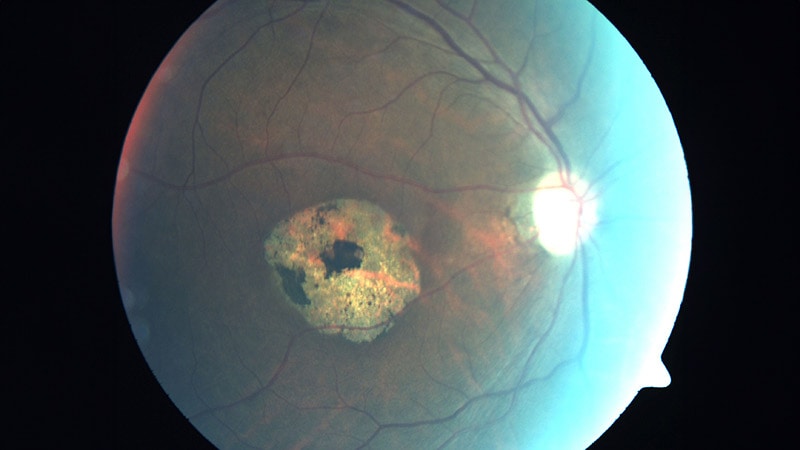SAN FRANCISCO — A modified form of vitamin A designed to be taken orally has been found to slow the rate of retinal degeneration in patients with Stargardt disease, a rare genetic eye disease that can cause vision loss in adults and children.
The TEASE trial, which investigator Christine Kay, MD, described as a “basket” of four independent clinical studies, evaluated the oral pill gildeuretinol in patients with Stargardt disease resulting from pathogenic variants of the ABCA4 gene.

Dr Christine Kay
“Gildeuretinol safely slows the growth rate of atrophic lesions with 150-plus patients treated to date,” reported Kay, director of retinal genetics at Vitreo Retinal Associates in Gainesville, Florida, at the 2023 annual meeting of the American Academy of Ophthalmology. “This is the first treatment to show efficacy in Stargardt disease with a randomized clinical trial.”
Gildeuretinol, also known as ALK-001, is designed to significantly reduce the propensity of vitamin A dimerization, the process by which molecules bind together to form a dimer and build up byproducts and lipofuscin in the retina. This process has the potential to slow or halt the growth of vision-threatening atrophic lesions in the retina. Gildeuretinol is taken as a once-daily pill.
TEASE-1 Trial Results
TEASE-1 enrolled 50 patients, aged 12-60 years, randomly assigning 30 of them to receive treatment with gildeuretinol and 20 to a placebo. Average age was 44.3 years. Ten patients in the placebo arm crossed over to treatment at 12 months, Kay said.
Patients had at least one eye with well-delineated areas of significantly decreased retinal vascular activity as detected on imaging using fluorescein angiography. The patients had either two ABCA4 disease-causing variants or one pathogenic ABCA4 variant plus a variant in any of seven “Stargardt-like” genes, she said.
“The primary endpoint was met,” Kay said. “Gildeuretinol slows the growth rate of atrophic lesions by 21%. This was clinically significant with or without the natural history cases.”
Using the untransformed area of atrophic lesions of mm2, that difference was 28%, which included natural history data of 185 eyes in the literature along with the placebo patients in TEASE 1, she said. The natural history data demonstrated a yearly loss of 2.2 decibels of vision, defined as a loss of sensitivity measured by microperimetry. The P value for both was less than .001, she reported.
The difference was even more pronounced for the growth of atrophic lesions within a 1.5-mm radius of the central retina, Kay said, showing a 34% reduction (P < .001).
She added that an analysis of retinal sensitivity favored gildeuretinol treatment across multiple subgroups, including for phenotype, genotype, and sex.
An analysis using microperimetry also found an 80% slower loss of retinal sensitivity in the TEASE 1 patients’ better eyes vs the natural history data, Kay said.
With regard to safety, Kay said, no clinically significant trends in liver function, delays in adaptation to the dark, or night blindness were observed. Overall, the patients tolerated gildeuretinol well with no significant changes in visual acuity, she said. One case of papilledema resolved with treatment with acetazolamide and the patient resumed treatment.
Longer Follow-up, Larger Trial Needed
Gildeuretinol is the first treatment to show efficacy in Stargardt disease; it has also shown functional benefit in terms of reduction of retinal sensitivity loss,” Paolo Lanzetta, MD, a professor at the University of Udine in Italy, who was not affiliated with the study, said. “Obviously, a longer follow-up and a broader population is needed for a full validation.”
However, he noted that the use of natural history data is a limitation and requires “careful consideration, especially in the interpretation of outcomes.”

Dr Paolo Lanzetta
Lanzetta said patients with Stargardt disease who have rapidly progressing atrophy may benefit most from gildeuretinol. For them, slowing the growth of lesions may mean saving the central retina. He added the treatment would also be well-suited for younger patients “to preserve central vision for as long as possible,” he said. “In general, intervention on early or intermediate stages of the disease may allow to preserve useful vision for a longer time.”
Alkeus Pharmaceuticals is sponsoring the TEASE trial and plans to submit a new drug application for ALK-001 in 2024 . Kay disclosed relationships with Alkeus, 4D Molecular Therapeutics, Atsena Therapeutics, Biogen, Gyroscope Therapeutics/Novartis, Iveric Bio, Kiora, MeiraGTx, ProQR Therapeutics, Opus, RegenxBio, and Spark Therapeutics.
Lanzetta disclosed relationships with AbbVie, Aerie, Apellis Pharmaceuticals, Bayer, Biogen, Boehringer Ingelheim, Genentech/Roche, Novartis, Ocular Therapeutix, and Outlook Therapeutics.
Richard Mark Kirkner is a medical journalist based in the Philadelphia area.
Source: Read Full Article
